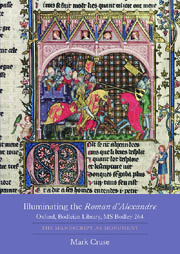 Illuminating the 'Roman d'Alexandre': Oxford, Bodleian Library, MS Bodley 264
Illuminating the 'Roman d'Alexandre': Oxford, Bodleian Library, MS Bodley 264 Book contents
- Frontmatter
- Contents
- List of Illustrations
- Acknowledgements
- Abbreviations
- Introduction
- 1 A Monument to Cortoisie
- 2 Urban Conquest and Spectacle
- 3 “Apraigne d'Alixandre”: Illuminating Exemplarity in Bodley 264
- 4 Alexander, Crusade, and the East in Bodley 264
- 5 The Production, Patronage, and Later Reception of Bodley 264
- Conclusion: Alexander in the Late Middle Ages
- Afterword: Mirror In Pixels
- Bibliography
- Index
- Already Published
3 - “Apraigne d'Alixandre”: Illuminating Exemplarity in Bodley 264
Published online by Cambridge University Press: 05 February 2013
- Frontmatter
- Contents
- List of Illustrations
- Acknowledgements
- Abbreviations
- Introduction
- 1 A Monument to Cortoisie
- 2 Urban Conquest and Spectacle
- 3 “Apraigne d'Alixandre”: Illuminating Exemplarity in Bodley 264
- 4 Alexander, Crusade, and the East in Bodley 264
- 5 The Production, Patronage, and Later Reception of Bodley 264
- Conclusion: Alexander in the Late Middle Ages
- Afterword: Mirror In Pixels
- Bibliography
- Index
- Already Published
Summary
After the discussion of the social and spatial contexts of Bodley 264 in the first two chapters, we now move in the next two chapters to a consideration of the manuscript as a portrait of exemplarity. The quotation in the title of this chapter is taken from the Entrée d'Espagne, a Franco-Italian poem composed c.1300 and based on the Pseudo-Turpin chronicle. It recounts Roland's adventures in Spain and the Orient, and begins with the hero in Iberia fighting the Saracens for Charlemagne. After seizing the Castle Noble, Roland enters and finds painted on the walls the adventures of Alexander the Great. Following a seventeen-line description of these images, which depict major events from the killing of “Neptanabus” [Nectanabus] to the crowning of Alexander's twelve “palatin,” Roland calls his companions and says:
Veez qe feit largeçe, qi veit por son chemin.
Cil conquist por largeçe la tere e le marin;
Onques mais aveir homes n'ensira de topin.
Qi volt honor conquere sor son felons vesin
Apraigne d'Alixandre la voie et le traïn.
(lines 10430–34)See what is done by generosity, which opens the way.
This man conquered the earth and the sea through generosity;never since has anyone been his equal.
Whoever wishes to conquer his enemies with honor,
learn from Alexander the path and the conduct.
- Type
- Chapter
- Information
- Illuminating the 'Roman d'Alexandre': Oxford, Bodleian Library, MS Bodley 264The Manuscript as Monument, pp. 103 - 144Publisher: Boydell & BrewerPrint publication year: 2011


